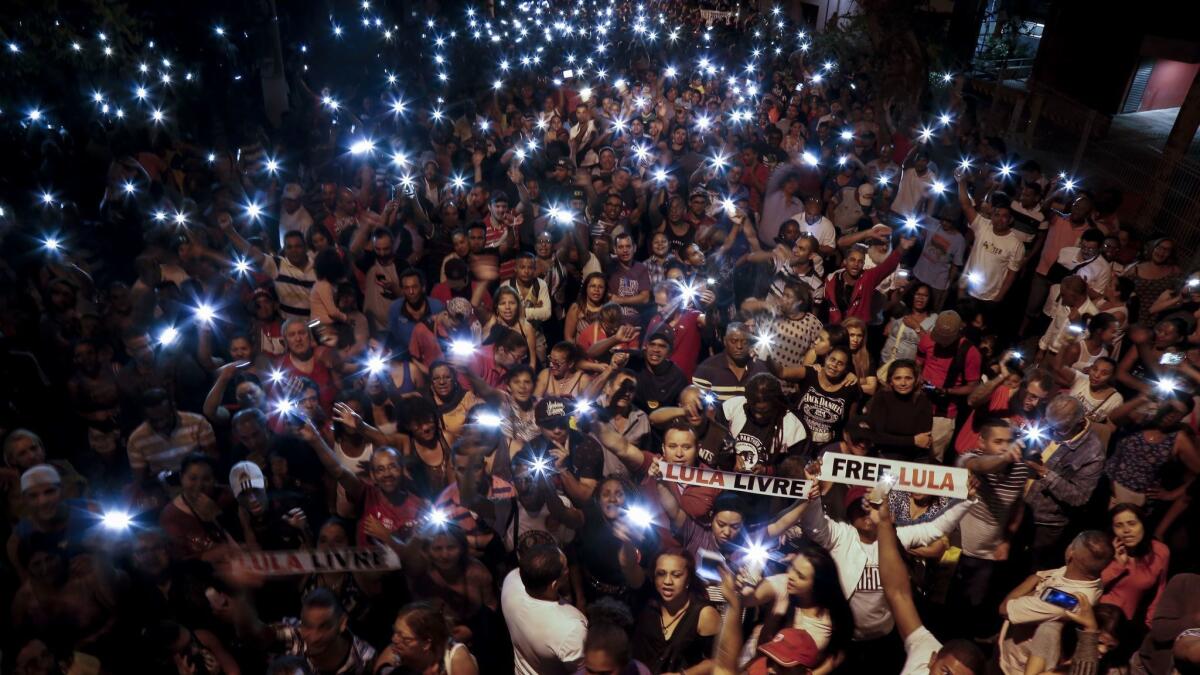Brazil’s judges duel over whether to release former President Lula from prison

- Share via
Reporting from SAO PAULO, Brazil — Even in prison, this country’s once-popular former president remains a deeply polarizing figure.
On Sunday, Brazilian judges issued contradicting orders on whether former President Luiz Inacio Lula da Silva should be freed while he appeals a 12-year prison sentence for money laundering and corruption.
Rogerio Favreto, the federal judge on call Sunday, said that Lula should be released immediately. His decision came after members of the former president’s Workers’ Party filed a request Friday for his release.
Lula, whose conviction was part of the countrywide anti-corruption investigation known as Lava Jato, or Car Wash, started serving his sentence April 7 but insists he’s innocent and says the case against him is politically motivated.
Sergio Moro, the federal judge who oversaw Lula’s trial, blocked Favreto’s initial decision Sunday and asked police to wait for judicial clarification before freeing the former president.
“With all due respect, [Favreto] has absolutely no qualified authority to override the decision,” Moro said.
Nonetheless, Favreto issued his ruling a second time, and this time federal Judge Joao Pedro Gebran Neto, the rapporteur on the case, stepped in to block Favreto, who responded by making his ruling for a third time and giving police an hour to follow through with his request.
That deadline, however, came and went and Lula remained behind bars.
Finally, the federal court’s president, Carlos Eduardo Thompson Flores, ruled that Lula will remain in prison, at least for now.
Once wildly popular after his two terms as president from 2003 to 2011, Lula has become a more divisive figure amid the massive Car Wash corruption scandal.
Lula was convicted a year ago of accepting $1.2 million in bribes from contractor OAS, which prosecutors said was used to buy and renovate a luxury penthouse apartment in the seaside town of Guaruja. Prosecutors claimed that in return, Lula helped the construction firm win contracts with Petrobras, the state-run oil giant.
The former president was initially sentenced to 9 ½ years in prison, a term that was increased to 12 years and 1 month when his conviction was upheld in January.
Despite being imprisoned for the last three months, Lula continues to lead opinion polls in October’s presidential election, with 30% of the vote in a June survey conducted by the polling company Datafolha. His conviction, however, could disqualify him from taking part in the race.
Brazil’s Clean Slate Law prohibits anyone who has had his “mandate” revoked from seeking elected office for eight years. That applies, for example, to those convicted by a panel of judges or someone who resigned from office to avoid being impeached. Lula, whose conviction was unanimously upheld by a three-judge panel, would not be able to run for office again until he’s 80.
But that didn’t stop his Workers’ Party from announcing in January that it would register Lula as its presidential candidate in August. Once Lula is a registered candidate, the electoral court will decide whether he is eligible to run. The deadline for the court’s final decision on candidate eligibility is Sept. 17.
Langlois is a special correspondent.
More to Read
Sign up for Essential California
The most important California stories and recommendations in your inbox every morning.
You may occasionally receive promotional content from the Los Angeles Times.










